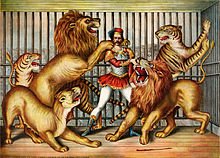The Lion's Ecosystem: A Look into the King of the Jungle
Lions are one of the most iconic and majestic creatures in the animal kingdom. Known as the "king of the jungle," these big cats are a symbol of power, strength, and courage. But beyond their reputation as fierce hunters, lions play a crucial role in their ecosystem.
Habitat and Range
Lions are found in sub-Saharan Africa, with small populations also present in India. They inhabit grasslands, savannas, and forests, where they can find adequate prey and water sources. Lions are social animals, and they live in groups called prides. A pride typically consists of one to three adult males, several females, and their offspring.
Diet and Hunting
Lions are apex predators, meaning that they are at the top of the food chain in their ecosystem. They primarily hunt large herbivores such as antelopes, zebras, and wildebeests. Hunting is a group effort for lions, with females doing most of the hunting while males guard the pride's territory. Lions are ambush predators, and they rely on their stealth, strength, and speed to take down their prey.
Role in the Ecosystem
Lions play a crucial role in their ecosystem, and their presence has a ripple effect on other species. By preying on large herbivores, lions help regulate their populations and prevent overgrazing, which can lead to desertification. Lions also serve as a food source for scavengers such as hyenas, vultures, and jackals. In addition, lions' hunting behavior creates a "landscape of fear," which affects the behavior of prey species and can influence their movement patterns and grazing habits.
Threats to Lions
Despite their importance in the ecosystem, lions face numerous threats. Habitat loss and fragmentation, caused by human activities such as agriculture and urbanization, are major threats to lion populations. Additionally, lions are sometimes hunted for sport, and they are also killed in retaliation for preying on livestock. Climate change is also a potential threat to lions, as it can alter their habitat and disrupt the prey-predator balance.
Conservation Efforts
To protect lion populations and their ecosystems, conservation efforts are underway. These efforts include the establishment of protected areas and wildlife corridors, as well as community-based conservation initiatives that involve local communities in conservation efforts. Education and awareness campaigns are also important in promoting conservation and reducing human-lion conflicts. With these efforts, we can ensure that the king of the jungle remains a symbol of power and strength in our ecosystems for generations to come.
